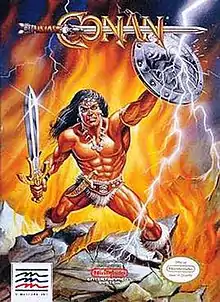| Conan | |
|---|---|
 Cover art (NES) | |
| Developer(s) | Mindscape |
| Publisher(s) | Mindscape |
| Composer(s) | Nick Eastridge |
| Platform(s) | NES |
| Release | |
| Genre(s) | Action |
| Mode(s) | Single-player |
Conan (also known as Conan: The Mysteries of Time) is a side-scrolling action video game for the Nintendo Entertainment System released in 1991. It was developed and published by Mindscape. While it features the Conan the Barbarian character, it is a simple adaptation of a computer game called Myth: History in the Making, which was developed by System 3.[1]
Gameplay
One night, the titular Conan, who seeks the throne of Aquilonia, is informed of a legend by a mysterious old man named Nemonios popping out of a campfire; there are Four Urns of the kingdom's Early Kings have vanished from their location in the Crypt of Cahalla, and that whoever returns these Urns shall gain the throne.[2]
Conan is an action-adventure video game that lasts six levels:[3] the Catacombs of Belveras,[4] the Ruins of Ry-leeh in Brythunia,[4] Kordavo at the "mouth" of the Black River,[5] the Forests of Asgard,[5] the Sky Castle of Vanaheim, and the Tombs of Zamboula, the location of the four Urns.[5] It is also a puzzle game, as the player has to figure out the hidden locations of special weapons to complete bosses;[3][6] info about the items are in the game's instruction manual, except for the location.[6]
Reception
| Publication | Score |
|---|---|
| AllGame | |
| Exposed | 1.5/10[8] |
| GamePro | 3.6/5[lower-alpha 1] |
Critical reviews for Conan were mixed-to-negative; Skyler Miller of AllGame called it one of the worst NES titles ever,[7] the author of Video Game Bible, 1985–2002, Andy Slaven, labeled it "platform gaming at its worst,"[9] and Game Players journalist Jeff Lundrigan described it as an interesting "combat puzzle" gameplay idea marred by poor execution.[6]
The difficulty was frequently criticized, with reviewers claiming that it's near impossible to get past the first level[8][7] and beat the game without cheat codes.[1] Lundrigan noted that while the character jumps in the air, his movement stops when hit by an enemy, leading to instant kills as a result of falling in bottomless pits.[6] Brett Weiss wrote the player had to work with "pitiful, sluggish attacks (including short-range punches, limp swordsmanship, and hard-to-execute jump kicks)."[1]
Reviews, even a positive one from GamePro also attributed the difficulty to the awkward controls, criticizing decisions of pressing down to jump[8][7][6] and having to push both an A-or-B button and the D-pad to perform movements like ducking.[3] The backgrounds were also dismissed as bland.[8][7]
Notes
References
Citations
- 1 2 3 Weiss, Brett (2012). Classic Home Video Games, 1985-1988: A Complete Reference Guide. McFarland. ISBN 9781476601410. Retrieved September 16, 2020.
- ↑ Instruction manual 1990, pp. 5–9.
- 1 2 3 4 The Missing Link (August 1991). "Conan". GamePro. No. 25. p. 20.
- 1 2 Instruction manual 1990, p. 10.
- 1 2 3 Instruction manual 1990, p. 11.
- 1 2 3 4 5 Lundrigan, Jeff (July 1991). "Conan". Game Players. No. 25. p. 79.
- 1 2 3 4 5 Miller, Skyler. "Conan". AllGame. Archived from the original on December 12, 2014. Retrieved October 20, 2017.
- 1 2 3 4 "RETRO REVIEW: Conan – The Mysteries of Time". Exposed. August 19, 2015. Retrieved September 14, 2020.
- ↑ Slaven, Andy (2002). Video Game Bible, 1985-2002. Trafford. p. 100. ISBN 9781553697312. Retrieved September 16, 2020.
Bibliography
- Conan instruction manual. Mindscape. 1990. pp. 1–19.